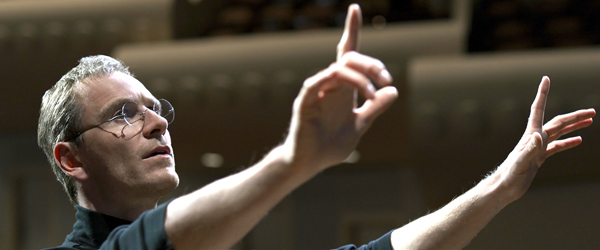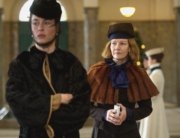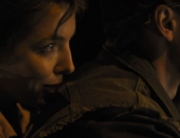Steve Jobs, the movie, is more admirable as a meticulously constructed piece of theater that uses real-life figures like billiard balls than for its emotional catharsis or insight into the evolution of a man many perceived as a larger-than-life genius. At the New York Film Festival press conference, scriptwriter Aaron Sorkin insisted he did not want to do a biopic with the familiar cradle to grave structure. Instead, he boiled down the biography (by Walter Isaacson, sitting next to him at the conference) into key pivotal events in three acts with five reoccurring relationships.
Each act is preceded by a busy montage of TV news, headlines, and speculation about Apple Inc.’s financials and future (including “fair use” of the famous 1984 Super Bowl ad). The tensions play out in fictionalized backstage confrontations during the restless 40 minute countdown before a new product will be unveiled in front of a full audience. Cinematographer Alwin Küchler uses a Steadicam in 10-minute takes to capture Sorkin’s signature walk-and-talk dialogue. As Jobs, Michael Fassbender stars as the petulantly arrogant white cue ball for the others to bounce off. Act 1, the strongest section, was filmed in 16mm at the very same Flint Auditorium of De Anza Community College where the Macintosh was introduced in 1984. This part is set to composer Daniel Pemberton’s percussive rhythms made by period synthesizers.
Sorkin calls Jobs “the king in exile” from Apple, in the red-for-revenge tinged 35mm act 2. At the San Francisco Opera House, Jobs is about to introduce the 1988 NeXTcube with operatic flourishes suitable for its overhyped promises. In 1998 at the city’s modern Davies Symphony Hall, Jobs begins to look like his later iconic public persona, as filmed using the ALEXA digital camera accompanied by music composed with Apple software. His coming personal changes and technological innovations beyond his new colorful iMac are hinted at in the unsatisfying act 3 denouement.
The humans in these settings vary as to how much they, too, change. In each act, Jobs’s renowned gift for charismatic inspiration that spurred employees to achieve more on tight deadlines than they thought possible (as more negatively emphasized by Alex Gibney in his documentary Steve Jobs: The Man In The Machine) seems reduced to presentation perfectionism and his barking, “Fix it now!” That demand is first heard to original Mac programmer Andy Hertzfeld (Michael Stuhlbarg) to get the demonstration Macintosh to speak a welcoming “Hello” to the auditorium.
Bearded Steve “Woz” Wozniak (Seth Rogen), Apple cofounder whose youthful programming partnership in the almost mythical Jobs’s family garage is glimpsed in a too-brief flashback, is pretty much reduced to voicing complaints, gripes that Woz always wished he’d said to Jobs, according to Rogen. Woz unsuccessfully lobbies Jobs in act 1 to open up the locked Mac to other developers, who Jobs derides as “hobbyists.” In the next acts, he repeatedly pleads for Jobs to publicly credit the team who worked on the Apple II, the financial mainstay of the company for years. Frustrated, he challenges Jobs’s technical bona fides, blasting that he’s not the best engineer, programmer, or designer: “What do you do?” Imperiously, Jobs shoots back, “I play the orchestra.” (Boyle chortled to the press that he sees the director in a similar role.)
On the business axis, John Sculley’s role in Jobs’s life is expanded to represent all the older men Jobs flattered as being like his father figure. Jeff Daniels, with his experience on Sorkin’s HBO series The Newsroom, and Stuhlbarg are the only actors in the ensemble who turn the rapid-fire dialogue into personal conversation. Sculley and Jobs keep sparring through the arc of their relationship, mostly seen in effective flashbacks, from Jobs recruiting Sculley for Apple CEO, then the board meeting where Sculley gave the members the ultimatum to either keep Jobs for his long-term vision or Sculley for his immediate financial management acumen. A not very convincing reconciliation occurs in act 3 as Apple rebounds under Jobs’s triumphant return.
Almost on screen as much as Fassbender, Kate Winslet plays Joanna Hoffman, one of Apple’s earliest employees and Jobs’s most loyal friend who was quoted just a few times in Isaacson’s book and heretofore is barely known even to the Internet. Though she’s Apple marketing director, she only once gets to indicate any expertise. She’s mostly there to nag him into behaving like a mensch (though her Eastern European origins are only vaguely referred to in the dialogue and through Winslet’s flickering accent). As exasperated as Hoffman is that “I have to explain you to people,” her key accomplishment is forcing him to deal with his problematical personal life.
The emotional heart of each act are the ghosts from Jobs’s youthful hippie lifestyle, who may be unfamiliar to some in the audience: Jobs’s impoverished ex-girlfriend from Apple’s early days, Chrisann Brennan (Katherine Waterston), and their daughter, Lisa, who he refuses to recognize, despite a paternity test. She grows up in each act, at five years old played by Makenzie Moss, at nine by Ripley Sobo, and at rebellious 19 by Perla Haney-Jardine. While the mother rages against his public accusations of her infidelity and profligacy, the daughter has brief intimate moments with him and his products in each act to charmingly reveal their natural affinity (that Sorkin gleaned from new interviews not in the book).
The final plot resolutions just don’t support or signal the changes Jobs will next commit to in his personal and technological future. This is a gap in explaining how Jobs later settled happily into a second family life while achieving the predictions that seemed impossible when sci-fi writer Arthur C. Clarke anticipated (as quoted in the prologue) the ubiquity and integration of personal computers into everyday life. Like Gibney’s documentary, Steve Jobs can’t quite pinpoint the heart of the global adulation and grief at his death.







Leave A Comment